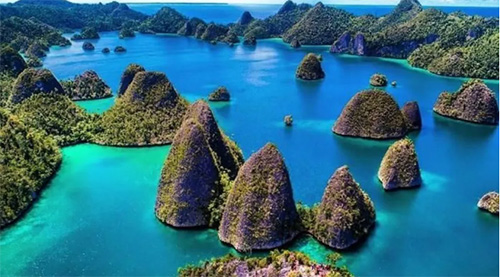
West Papua’s famed Raja Ampat islands, an area of great biodiversity as well as a picturesque tourist destination was recently honoured with The Blue Park Award by the Marine Conservation Institute, which recognizes outstanding marine protected areas (MPAs) all over the world. An MPA is a section of ocean where a government has limited human activity in order to protect it from threats including overfishing, litter, water pollution, and the effects of global climate change.
The Raja Ampat Islands Marine Conservation Area in Indonesia, along with the Apo Reef Natural Park in the Philippines, and Old Providence McBean Lagoon National Park in Colombia received the prestigious honour at the United Nations Ocean Conference, held on 27 June – 1 July 2022.
The three new Blue Parks, covering a total area of 13,834 sq. km join a growing network of 24 Blue Parks all over the world, recognized for outstanding conservation effectiveness. With their inclusion, Blue Parks now encompass a total of 1,834,171 sq. km of protected waters in 20 countries.
Raja Ampat is located in the heart of the vast Coral Triangle, and is considered one of the most biodiverse locations in the world, with a staggering variety of marine life. Covering roughly 4.6 million hectares of land and sea, 2 million of which make up the Marine Protected Area, the islands are home to more than 1,600 species of fish, 75% of the world’s known coral species, 6 of the 7 known species of vulnerable to critically endangered sea turtles, and 17 known species of marine mammals.
Raja Ampat’s geographical location, sheer biodiversity, and high sea temperatures all year round have made it a magnet for tourists, particularly diving enthusiasts from all over the world. Divers who explore its waters may encounter a number of interesting species including black manta rays, pygmy seahorses, and mantis shrimps, and garden eels.
The success of Raja Ampat as an MPA is due to a collaborative effort launched in 2004 which brought together the local communities, the regional government, and three NGOs – Conservation International, The Nature Conservancy and World Wildlife Fund in order to protect the region’s biodiversity, address illegal fishing and secure management for its marine ecosystems. Uniquely, this effort integrates traditional practices including Sasi, a local custom which, in the simplest terms, prevents overexploitation of marine resources by placing limits on fishing in order to allow ecosystem recovery and improve sustainability.
The Blue Park Awards have been given by the Marine Conservation Institute to national governments, non-profit organizations, MPA managers, and local communities who have demonstrated exceptional efforts in the protection of marine ecosystems since 2017. The winners are selected based on rigorous science-based standards for conservation effectiveness. According to the Marine Conservation Institute, the goal of the initiative is to celebrate effective MPAs and incentivize governments, managers, communities and leaders to achieve effective conservation.
Adapted from:
Marine-conservation.org, Conservation.org, National Geographic, Antara News, and Tribun Papua Barat.
